1 / 6
Since its very first concert on January 4, 1896 the orchestra has been led by and comprised of outstanding artists, all of whom have contributed to building the Czech Philharmonic's excellent reputation at home and around the world. The orchestra's activities have also significantly – for better or for worse – tended to manifest the artistic, cultural, and political context reflective of the times.

1896 / Dvořák „christens“ the Czech Philharmonic
Saturday, January 4, 1896 at 19:30 – the precise time of the Czech Philharmonic’s historic first concert. On the program and on the podium is Antonín Dvořák. This most famous of Czech composers conducts his own works: the third Slavonic Rhapsody, the world premiere of Biblical Songs nos. 1-5, the Othello overture, and Symphony No. 9 „From the New World.“ We are in Prague’s Rudolfinum, where the largest concert hall will later bear Dvořák’s name. In his own way, Bedrich Smetana (1824-1884) is also present at this concert – he had wanted to create a tradition of symphonic concerts for Czech listeners even as far back as the 1860s. Also present are the initiators of the Society for the Maintenance of a Large Orchestra in the City of Prague, an organization founded in 1882. Its thoughts have now become reality thanks to the Czech Philharmonic organization and thanks to Dvořák. That Saturday night he gave the Czech Philharmonic his endowment with „honest, encouraging, and powerfully recommended evidence of its grace.“
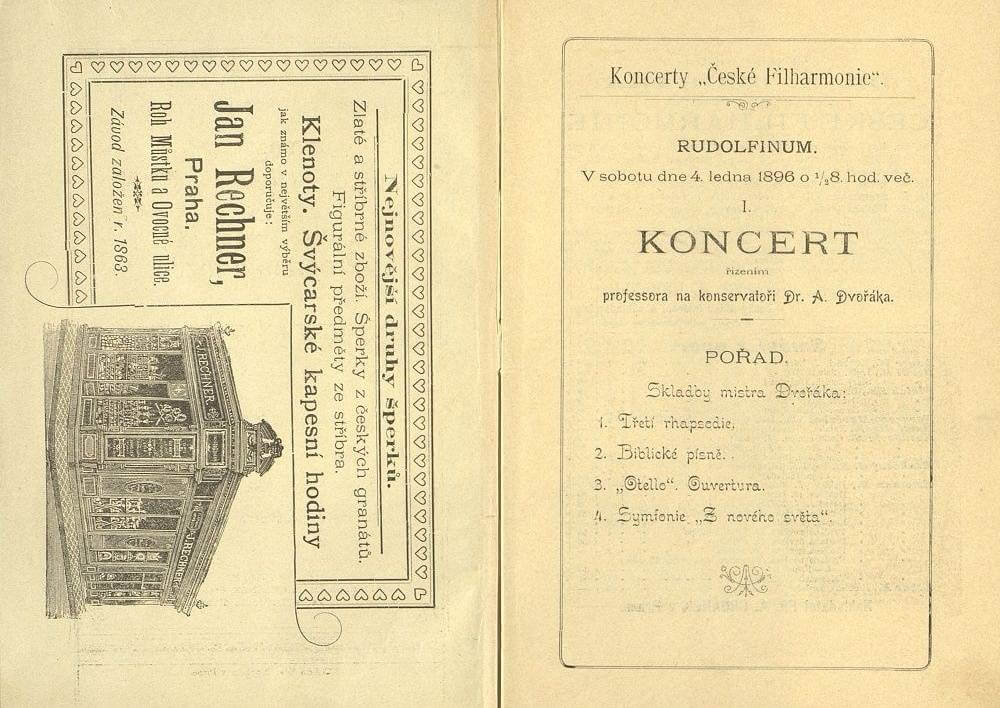
Programme of the first Czech Philharmonic concert / Photo: archive of the Czech Philharmonic
Why the Czech Philharmonic was founded
On June 7, 1894 the Prague Governor’s Office approved statutes which officially founded „the Czech Philharmonic, an organization for the enhancement of musical art in Prague, and a pension organization for the members of the National Theater Orchestra in Prague, its widows, and its orphans.“ Until 1901 the Czech Philharmonic remained a noble outlet for the „leisure time activities“ of National Theater musicians, who were committed to giving at least four large symphonic concerts of outstanding domestic and international works annually. The money these concerts earned went into a fund created to help support members of the organization who could no longer play as well as the immediate survivors of deceased musicians.
Members of the organization were required to participate in rehearsals and concerts. Musicians who came to rehearsals more than 15 minutes late received penalty payments of one gold piece, and unexcused absences at concerts were punishable by payment of five gold pieces. In these early years the Czech Philharmonic did not have a permanent Chief Conductor – its concerts were rather led by conductors such as Adolf Čech and Mořic Anger (both from the National Theater), Karel Kovařovic, Oskar Nedbal (then the violist in the Bohemian Quartet), and composer Zdeněk Fibich.
A life-endowing strike
On February 9, 1901 the members of the National Theater Orchestra (who were, at the same time, members of the Czech Philharmonic organization) went on strike against the head of the National Theater Opera, Karel Kovařovic. On February 15 the strikers were dismissed, and Kovařovic began to build a new theater orchestra. Displaced musicians decided to establish the Czech Philharmonic as a self-standing symphony orchestra. A general assembly elected 31 year-old Ludvík Vítězkav Čelanský (1870-1931) as the first Chief Conductor. A fight for survival then began. The orchestra was constantly playing and gave concerts almost everywhere. For example, between October and December of 1901, the Czech Philharmonic gave 49 concerts: 22 in Bohemian and Moravian cities and 15 in Prague. The orchestra performed in such locations as the Rudolfinum, at Žofín, in the National House in Smíchov, but also regularly appeared in the brewery in Smíchov (ironically, it was there that the orchestra performed Smetana’s My Country in completion for the first time on December 8, 1901). The Czech Philharmonic’s debut appearance abroad took place under conductor Oskar Nedbal in Vienna. The orchestra at the time was comprised of 62 members.
London (1902) and dogged persistence through permanent uncertainty (1903–1918)
Ludvík Vítězslav Čelanský unexpectedly resigned in April of 1902. Oskar Nedbal turned down the offer to become the orchestra’s Chief Conductor, but he did lead the Czech Philharmonic on an existentially significant tour to England in May and June of 1902. World-famous Czech violinist Jan Kubelík accompanied the orchestra, which was traveling under the title „The Kubelík Bohemian Orchestra.“ Nedbal wrote his friends from London that „this is the first time that an orchestra from the Continent has settled in London for a longer period of time. The London Philharmonic is allegedly raging…“
In January 1903, Vílem Zemánek (1875-1922) became the orchestra’s Chief Conductor. Under his leadership, the Czech Philharmonic regularly offered subscription concerts as well as concerts of popular music. In addition to performing music by composers from around the world, the sounds of premiers of works by Czech composers – Janáček, Suk, Novák – issued forth from the orchestra. On September 19, 1908 Gustav Mahler conducted the Czech Philharmonic in the premier of his own Symphony No. 7. Continuing to perform in restaurants saved the orchestra from financial ruin, as did adventurous enterprises such as a five month tour in Saint Petersburg, Russia (1904). Zemánek’s tenure, which brought system and order to the Czech Philharmonic, came to an end on April 16, 1918 at the train station in Pardubice, where the orchestra deposed its leader. Admittedly „…without the passionate, dogged persistance of Zemánek, there would be no Czech Philharmonic. He worked for what the orchestra needed and truly pushed it,“ Václav Talich later wrote.
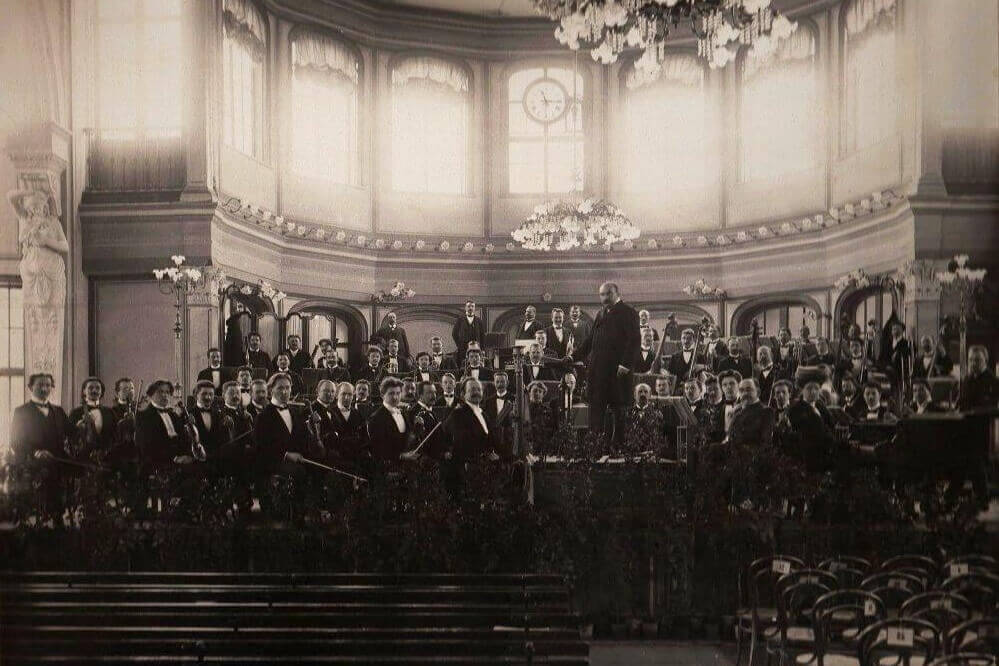
The orchestra with conductors Oskar Nedbal and Vilém Zemánek on one of their first international tours – in Pavlovsk, Russia in 1904 / Photo: archive of the Czech Philharmonic
„We’re free!“ – „That’s nice, but we must rehearse…“
A dress rehearsal for the world premier of Josef Suk’s new symphonic composition Zrání took place in the Municipal House in Prague on October 28, 1918. The streets of Prague were simmering, as proclamation of an independent Czechoslovak state was brewing. The then relatively-unknown 35 year-old conductor Václav Talich was working with the Czech Philharmonic to prepare this extremely difficult composition, a highlight of Czech classical music in the 20th century. He later recalled: „When we were in full fire, Hubička, then the executive director of the Czech Philharmonic, ran into Smetana Hall with cries of ‚We’re free! Everyone to the streets!‘ In the heat of our work we were unable to immediately feel and experience the range of meaning brought by Hubička’s news, so I said: ‚That’s nice, but we must rehearse!‘ We did not know what was happening in the streets, we did not hear because Smetana Hall was full of the sounds of Suk’s Zrání, and so we continued with our rehearsal. At once when we emerged into the streets, we experienced and felt what had actually happened! And that feeling of intoxication was so strong that I could not imagine how I might reunite the entire orchestra in order for a concert to take place.“ The premiere did indeed take place on October 30, 1918 – the first concert of the Czech Philharmonic in the Czechoslovak Republic. Zrání was met with success, as was Václav Talich, who proved to be an exceptionally energetic and persuasive artistic personality.
„You hate routine, pattern, and comfort. – You like to discover."
…wrote Stanislav Novák, concertmaster of the Czech Philharmonic between 1917 and 1936, to Václav Talich, arguably the most important figure in the history of the orchestra. During the 22 years that Talich stood at the orchestra’s head (1919-1941), an absolute world leader grew from a provincial, decent ensemble. Talich was the first conductor to work consistently and purposefully with the orchestra. He strove to bring into the orchestral sphere the interpretational ideals he had come to know during his time in the legendary Bohemian Quartet. He emphasized individuality and spontaneity of performance, a proper balance of voices in the framework of the orchestra’s whole sound, and respect for the composer’s wishes. He knew he could depend on the natural musicality and the „heart“ of his musicians, but that he needed to work on their precision and discipline.
Talich was an excellent dramaturg. He regarded the performance of Czech music as unquestionable, and in the first years of his leadership he led the orchestra through a detailed inventory: in the 1921-1922 season he focused on Czech symphonies, and in the following two seasons on Czech symphonic poems. He also brought French impressionist music, Mahler symphonies, Bartok, Stravinsky, Prokofiev, and Shostakovich to the core of the orchestra’s repertoire.
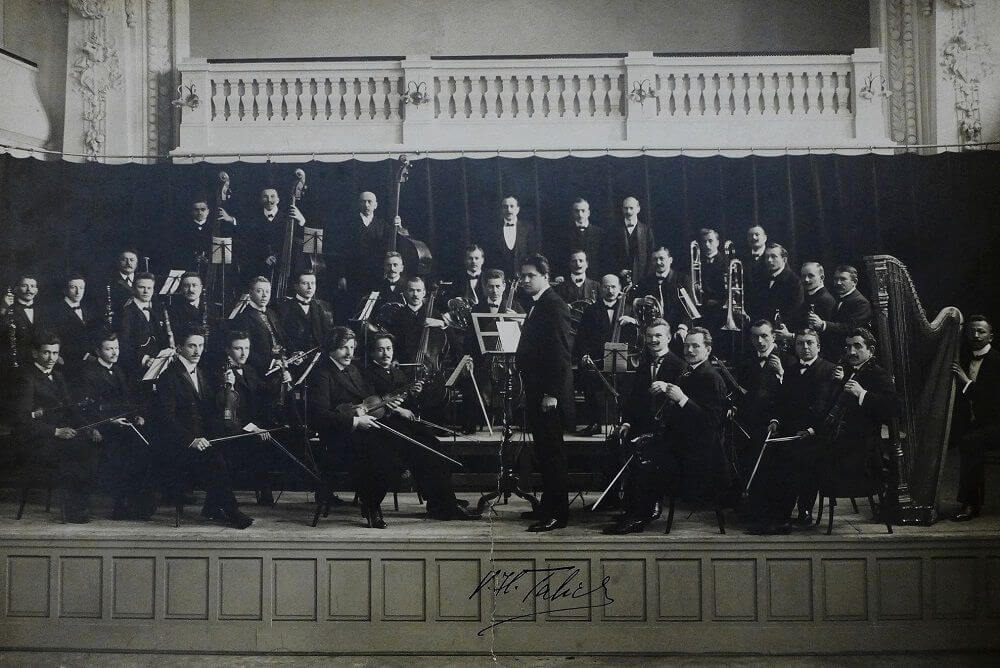
Václav Talich and the Czech Philharmonic in 1919 / Photo: archive of the Czech Philharmonic
In the service of the First Republic – at home and abroad
Talich wanted to use the Czech Philharmonic to help cultivate a Czechoslovak public space. He strove for excellence in the orchestra’s performances but also offered concerts for workers, young people, and a variety of organizations. The Czech Philharmonic played for the Czechoslovak Red Cross, the Czechoslovak Sokol, and for the Union of Slavic Women. In 1923 the orchestra gave a series of three benefit concerts for Russian, Austrian, and German orchestral players „intending to accentuate human cohesion alongside the suffering of other nationalities – cohesion which the politics of the day cannot effect.“
The Czech Philharmonic’s tours in the years 1918-1928 had a special touch. During this time, the orchestra was not just a musical ensemble, but also a cultural „ambassador“ of the young republic. In 1922 the orchestra traveled with Talich to Italy and to Vienna, and in 1926 to Slovenia and again to Italiy. Exceptionally noteworthy were three trips to western Europe: in 1935 with Talich (Great Britain, Belgium, France), and in 1937 (Great Britain, Scotland, Belgium) and 1938 (Great Britain) with Rafael Kubelík.
My Country in service of the swastika?
Smetana’s My Country has never been played as often as it was during the Nazi occupation (1939-1945). Its sounds emanated in Prague and in dozens of cities across the entire protectorate of Bohemia and Moravia. It incited national manifestations which soon led to a ban on performance of the cycle in its entirety (“Tábor” and “Blaník” were banned from any sort of performance). On February 11 and 12, 1941 the Czech Philharmonic appeared – at the instruction of Joseph Goebbels – in Berlin and Dresden. Talich put the entire My Country cycle on the program – a brave move in programming. But after its success in the bosom of the Reich, the cycle could once again be performed in the Protectorate. The Czech Philharmonic could not shy from giving concerts directly for the ruling regime: in March 1942 it played My Country for the Czech National Socialist Union and in April 1944 it gave a concert to celebrate “the 55th birthday of Fuhrer Adolf Hitler.”
On February 8, 1945, 31 year-old violist Zdeněk Němec was murdered by the Gestapo. He wrote about a Czech Philharmonic concert featuring My Country in which “…the triumphant march of the Knights of Blaník heard during some of the nation's most difficult moments brought salvation and rescued the nation from the shackles of darkness and bondage. Thus Smetana's work fulfilled its purpose during the First World War and continues to do so today.”
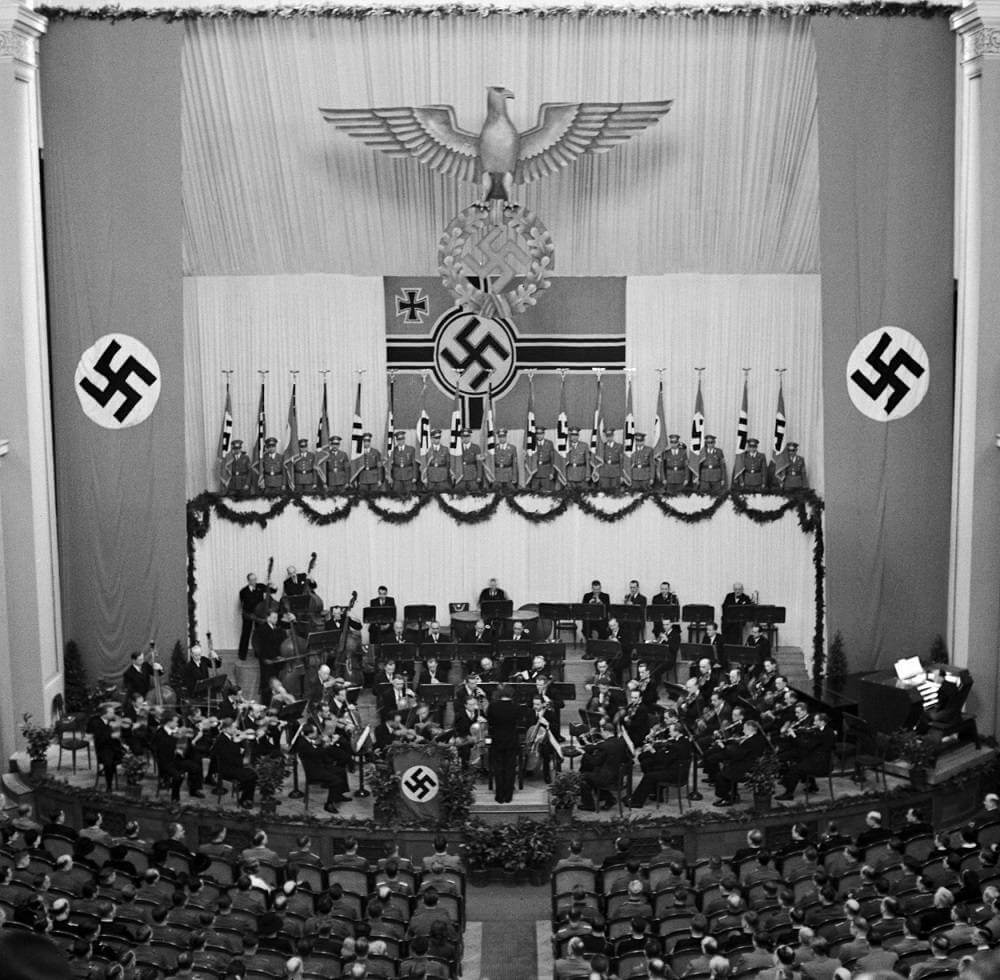
Czech Philharmonic in the era of the Protectorate of Bohemia and Moravia / Photo: Czech Press Agency
Seven years with Rafael Kubelík
Rafael Kubelík (1914-1996) became Chief Conductor of the Czech Philharmonic in autumn 1941, but he conducted the orchestra for the first time in January 1934 – at the age of 19! During the war he primarily conducted works which he believed would bring hope and faith to the people: Novák's Svatováclavský triptych, Janáček's Taras Bulba, and of course My Country…the orchestra performed My Country in a newly-liberated Czechoslovakia as a „Concert of Thanks“ on June 21, 1945. Kubelík's dramaturgy „paid debts“ via Russian, French, and Anglo-American music. For example, he conducted Britten's Sinfonia da requiem in a concert in November 1945 given in honor of the Nazi-exterminated towns of Lidice, Ležáky, and Javoříčko. Kubelík also restored the Czech Philharmonic's pre-war concert diversity: the orchestra played for the World Student Congress, in Czechoslovak churches, and even for a „democratic Spain.“
Kubelík also oversaw the renationalization of the Czech Philharmonic, bringing fifty years of existential uncertainty to a close on October 22, 1945. The Czech Philharmonic under Kubelík (in response to Talich's „Musical May“) founded the Prague Spring International Music Festival and performed all of its concerts during its first year in 1946. Kubelík conducted the Czech Philharmonic for the last time on July 5, 1948. He emigrated from communist-dictated Czechoslovakia soon thereafter.
Two conductors
After Rafael Kubelík left Czechoslovakia in exile, temporary conductors worked with the Czech Philharmonic for the next two years. Václav Neumann (1920-1995) and Karel Šejna (1896-1982), two members of the orchestra with ambitions toward conducting, appeared most often. Violist Neumann led the orchestra for the first time in March 1948, and then in September took over the concerts for the season. On May 18, 1949 Karel Šejna – a bassist since 1921 and a co-conductor since 1922 (during a half-century of cooperation he directed the orchestra in 588 concerts!) became Artistic Director of the Czech Philharmonic.
After February 1948, the orchestra was faced with an increasing number of “political orders” from a totalitarian regime. For example, in September 1949 it gave a concert in honor of the 700th anniversary of mining, in November it launched “Days of Czechoslovak-Soviet friendship,” on December 12 it performed in honor of the sixth anniversary of the signing of the Czechoslovak-Soviet contract, on December 20 it appeared at a meeting of the Central Committee of the Communist Party of Czechoslovakia held in honor of Stalin's 70th birthday, on January 20 it performed during a memorial evening in honor of the 26th anniversary of Lenin's death…
“Ančerl inhibits the Czech Philharmonic”
Few conductors have encountered such difficult situations during their time with the Czech Philharmonic as Karel Ančerl (1908-1973). After Minister Zdeněk Nejedlý named Ančerl Chief Conductor on October 20, 1950 an atmosphere of spontaneous resistance prevailed in the orchestra. The musicians saw their new leader as a politically handpicked intruder. The State Security reports from the Czech Philharmonic at the time inform us that “Almost every member of the orchestra is against Ančerl, whom they curse aloud and taunt, and they say the worst about him. It stems from the fact that the Czech Philharmonic's level is high and Ančerl is not good enough – he inhibits the Czech Philharmonic.” – Ančerl, however, proved to have an incredible degree of strength and toughness, when he responded only with helpfulness, calm, and constant work. He was always prepared for rehearsals, he worked economically and effectively; his first priority was quality, and any carelessness was not an option. As a dramaturge he anchored the orchestra with Bartok, Prokofiev, and Shostakovich alongside composers like Martinů, Hanuš and Kabeláč. Karel Ančerl ultimately left for Canada in protest of the August 1968 occupation of Czechoslovakia. He conducted his last two concerts with the Czech Philharmonic at the Prague Spring festival in spring 1969.
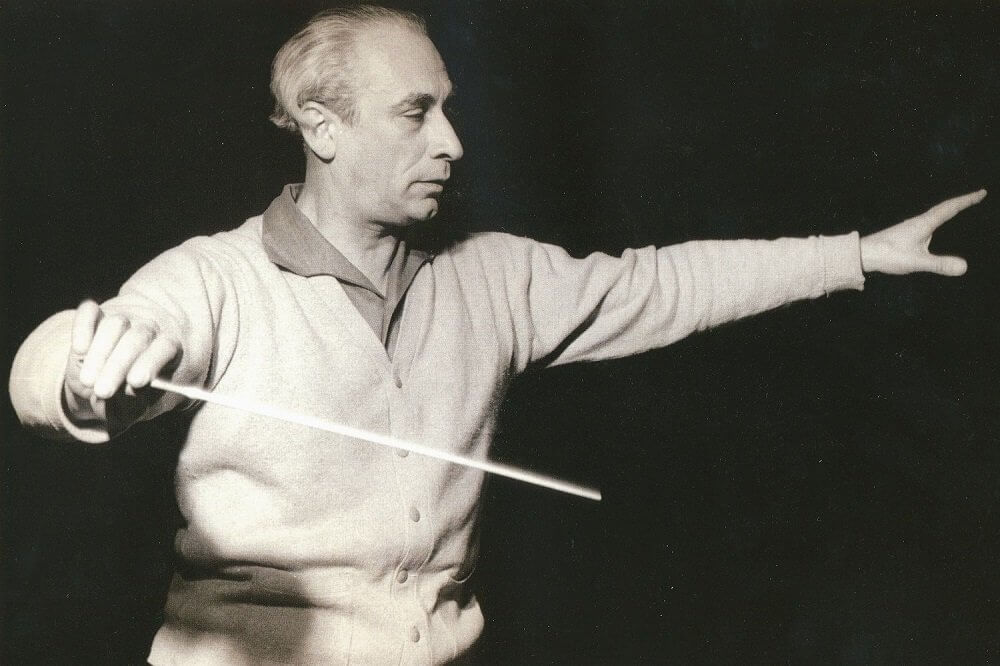
Karel Ančerl at a rehearsal / Photo: archive
Herbert von Karajan applauds…
Thanks to his exceptional artistic quality, Ančerl's era in the Czech Philharmonic brought the orchestra the biggest international “boom” in its history thus far. A total of 60 tours to 28 countries around the world included all of the most prestigious podiums from Vienna's Musikverein to New York's Carnegie Hall. The orchestra most frequently performed in Vienna, where critics wrote “if only our orchestras played Mozart's Prague Symphony as elegantly yet vigorously, as naturally, they would be in a particularly good mood. – It has demonstratively been seen through Herbert von Karajan's applause.” Additional performances followed in Germany, Switzerland, Great Britain, Hungary, the Soviet Union, France, Yugoslavia, Canada, Romania, USA, Australia, Belgium, Bulgaria, China, Denmark, Finland, Holland, India, Italy, Japan, Norway, New Zealand, Poland, Sweden, Turkey, and West Berlin.
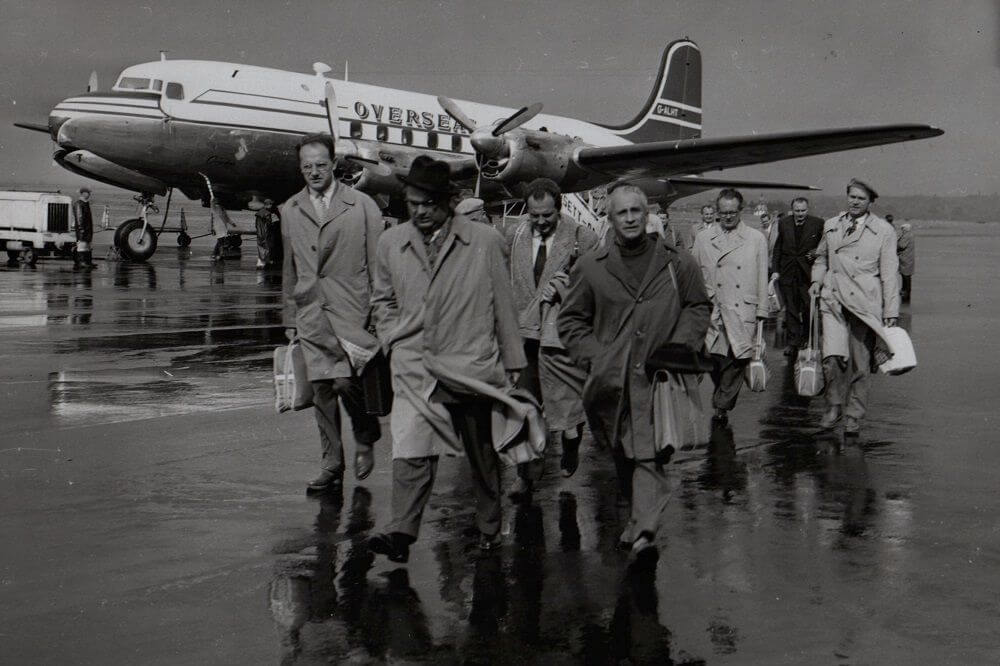
Czech Philharmonic arrives to Sydney in 1959 / Photo: archive of the Czech Philharmonic
Jan Palach
On January 16, 1969 university student Jan Palach lit himself on fire in protest against the post-occupation hopeless and resignation of the people. On January 23 and 24, 1969 the Czech Philharmonic's concerts included a commemoration of the deceased, and in April the orchestra performed Dvořák's Stabat Mater in another special concert. A year later, the start of “normalization” prevented further direct commemoration of Palach's sacrifice. Nonetheless Ivan Medek, the Czech Philharmonic's dramaturge, led a symbolic performance of Honneger's cantata Joan of Arc at the Stake in January 1970. Preparation for the concert did not go by without incident, but eventually the concert happened (although 14 days later than originally intended). It was conducted by Václav Neumann and it had a character of manifestation.
22 years with Václav Neumann
On December 19, 1968 Václav Neumann conducted his first Czech Philharmonic concert as Chief – musical, noble, and generous chief. In 1969 the orchestra played in the Prague Spring Festival and on tour in Japan under his baton. The 1970-1971 season was devoted to Beethoven – the Czech Philharmonic played all of Beethoven's symphonies and piano concertos (with Jan Panenka). Neumann also conducted a good amount of contemporary music by composers such as Hanuš, Havelka, Kalabis, Kapr, Feld, and Slavický. The Czech Philharmonic appeared for the first time at the Salzburg Festival with Neumann in August 1971. The Neumann era also brought an intensive cooperation with the record label Supraphon: over the years he released recordings of the complete Dvořák symphonies (twice – 1973 and 1987), Martinů's and Mahler's symphonies, and Dvořák's opera Rusalka. The television show “Performance and Conversation with the Czech Philharmonic” also became very popular in the 1970s. Neumann's tenure as Chief Conductor came to an end in September 1990.
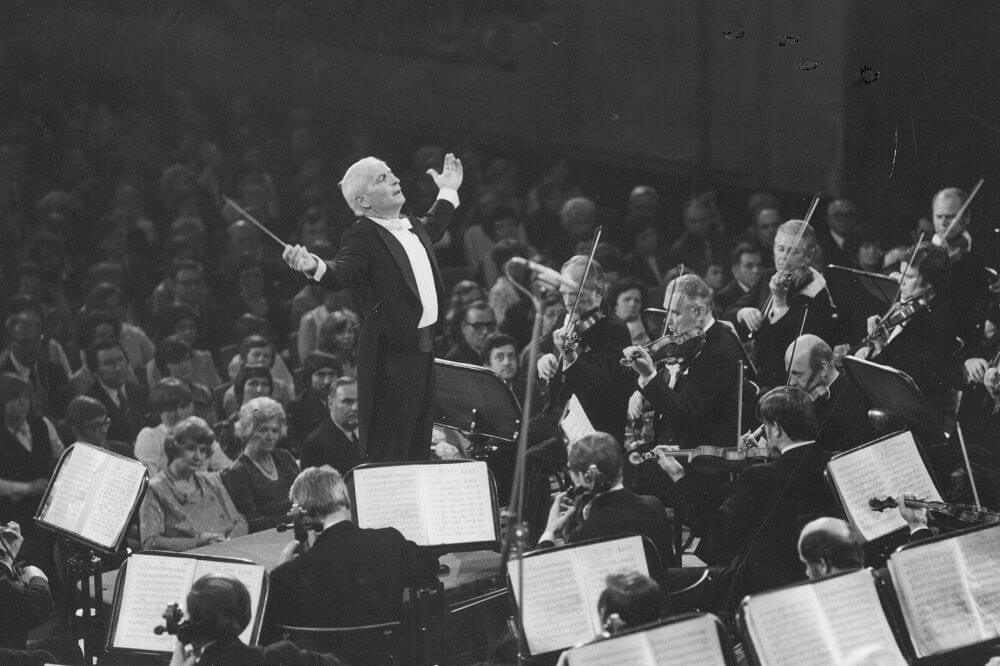
Václav Neumann conducting the Czech Philharmonic in late 1970s / Photo: archive of the Czech Philharmonic
“We lift our voices against injustice and violence…”
In October 1989 Václav Neumann ceased to cooperate with Czechoslovak radio and television. He was protesting against the persecution of those whom had signed the petition Několik vět (A few sentences), which had been prepared by the Charter 77 movement. Information about the petition reached foreigners in other countries through Ivan Medek, a Viennese colleague working with Voice of America. On October 25, 1989 while on tour in Stuttgart, the vast majority of the orchestra joined in sharing Neumann's opinion. The orchestra acquainted its listeners with its decision immediately before the outbreak of the Velvet Revolution – during concerts on November 16 and 17. Orchestra members subsequently participated in the November demonstrations, issued a statement called “Opinion of the Czech Philharmonic,” and joined in general strikes. Special concerts were directed toward students – the orchestra performed Smetana's My Country, Dvořák's Te Deum, or “Gaudeamus igitur” before them. Evening subscription concerts were also transformed, with sociologists, civic politicians, and actors addressing the audience before each concert. An unforgettable era in the orchestra's history reached a special peak with a performance of Beethoven's Symphony No. 9 on December 14, 1989 in a concert for the Civic Forum. Alongside the orchestra, Václav Havel was also given ovations.
Rafael Kubelík: “I have passionately waited for this moment and I have believed that one day it will come. I am thankful to God, our whole nation, friends, and all of you.”
These were the first words spoken by Rafael Kubelík on April 8, 1990 after his return from a 42-year exile. During that time he had received several offers to return to the orchestra and he repeatedly replied that he would happily return but only under the condition of “freedom of opinion, freedom of creation, freedom of expression, and freedom of movement for every decent Czech and Slovak with or without talent.” At the Prague Spring Music Festival in 1990, he conducted the orchestra in the opening concert on May 12. Just as after the end of World War 2, Smetana's My Country sounded over Old Town Square in honor of all Czechoslovaks. The orchestra also performed a “concert of mutual understanding” on the day of the first free elections – June 9, 1990. On July 1, Kubelík wrote the orchestra: “Dear friends – in my thoughts I am still in Prague – home! – For all the beautiful music, loyalty and love – which you have so generously given me – I thank you – from my whole heart! Be healthy and strong – for the health of our music! I embrace you most warmly – Your Rafael Kubelík”
Kubelik's last concert with the Czech Philharmonic was in November 1991 on tour in Japan.
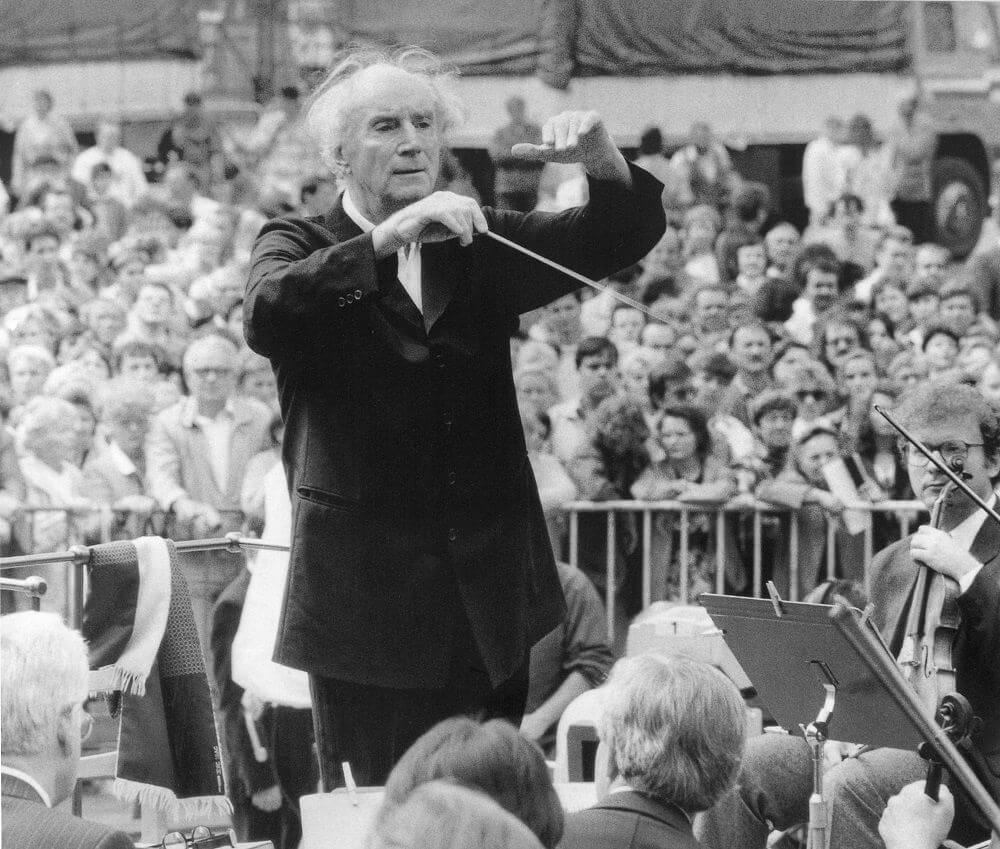
Rafael Kubelík conducting the Czech Philharmonic at the special concert at the Old Town Square in Prague in 1990 / Photo: Zdeněk Chrapek, archive of the Czech Philharmonic
Bělohlávek / Albrecht / Válek
Over the last 20 years of its history, the Czech Philharmonic has been characterized by frequent changes in its management and its artistic leadership. Between the years 1990 and 2012 the Czech Philharmonic has had the same number of Chief Conductors as it had between 1901 and 1990: altogether 5. Jiří Bělohlávek (1946) became Chief Conductor after Neumann. Shortly after his arrival he conducted the orchestra in a concert in New York, but in 1992 he announced his resignation from the post. German conductor Gerd Albrecht (1935) led the orchestra from October 1, 1993 until January 30, 1996, widening its repertoire to include, for example, works by the so-called “Terezín composers” (Ullman, Klein, Haas). Both Bělohlávek and Albrecht participated in the celebrations in honor of the 100th anniversary of the Czech Philharmonic, dividing the conducting duties for the celebratory concert on January 4, 1996. After Albrecht's departure, the orchestra was led by Vladimír Válek (1935) for two years. On March 7, 1996 Krzysztof Penderecki conducted the orchestra in the premiere of his Concerto for Clarinet and Chamber Orchestra. On September 6, 1997 the orchestra played for participants in Havel's first annual conference Forum 2000.
Ashkenazy / Mácal / Inbal
Pianist and conductor Vladimir Ashkenazy (1937) conducted the Czech Philharmonic for the first time in January 1997 – a year later, he became the orchestra's Chief Conductor. Some of his programming choices included the cycle “Nordic Sound in Prague 2001-2002” and the project “Agreement and Protest in Soviet Music.” Under his baton, the Czech Philharmonic performed 32 concerts in the USA and 20 in the Far East. Zdeněk Mácal became Chief Conductor in August 2003 and resigned in September 2007 – during his time with the orchestra, the Czech Philharmonic appeared at the Schleswig-Holstein Festival, in Japan, and in Taiwan. He also recorded the complete Dvořák, Tchaikovsky, Mahler, and Brahms symphonies with the orchestra for the Octavia Records label. The Czech Philharmonic's Chief Conductor since 2009, Israeli Elijahu Inbal (1936), has primarily focused on Mahler in his programming. In 2009 a long era of cooperation with the British conductor Sir Charles Mackerras (1925-2010) came to a close. He recorded Janáček's operas Šárka and Káťa Kabanová and Dvořák's Rusalkawith the orchestra, and he also conducted concerts in Edinburgh (2000), at the BBC Proms, and in the Musikverein in Vienna (2004).
The Return of Jiří Bělohlávek
In October 2012, Jiří Bělohlávek returned to the Czech Philharmonic as its chief conductor and music director after nearly two decades. Following a period of uncertainty and turbulence, Bělohlávek’s artistic vision was both an anchor and a beacon. Through his cooperation with new management, important impulses and, above all, an orderly approach were brought to not only the orchestra’s repertoire, but also its touring, recording, and new educational activities. As a kind of mission statement, the orchestra played the complete symphonies of Antonín Dvořák (along with the three concertos) at concerts under Jiří Bělohlávek’s baton and recorded them for the Decca Classics label to worldwide acclaim. With its chief conductor, the Czech Philharmonic returned to important concert stages: New York’s Carnegie Hall, London’s Royal Festival Hall, and Vienna’s Musikverein and Konzerthaus. Maestro Bělohlávek became the patron of the activities of the Orchestral Academy, supporting a new generation of orchestral musicians, serving as patron for competitions for composers and performers, and also working with pupils at elementary schools of the arts and with the Romany choir Čhavorenge.
Among the memorable concerts were performances of Janáček’s Jenůfa with Karita Mattila and Martinů’s one-act opera What Men Live By and Maestro Bělohlávek’s artistic collaborations with Yo-Yo Ma, Joshua Bell, Hélène Grimaud, Jean-Yves Thibaudet, Nikolaj Znaider, Alisa Weilerstein, Kirill Gerstein, and Behzod Abduraimov. Jiří Bělohlávek performed Janáček’s Glagolitic Mass in the original version from 1927, and for a children’s audience he appeared as the chief wizard Bělokněžník. At one of the new open-air concerts he appeared with Bobby McFerrin, and he worked regularly with Alice Nellis and Marek Eben on the educational programme An Orchestra Rehearsal. Jiří Bělohlávek conducted a total of 269 concerts with the Czech Philharmonic, 155 of them on tours abroad.
Semyon Bychkov first appeared with the Czech Philharmonic in February 2013, and he eventually became artistic director of the Tchaikovsky Project, recording Tchaikovsky’s complete symphonies. Among other artists to collaborate with the orchestra in 2012–2017 were the conductors Manfred Honeck, Stéphane Denève, Sakari Oramo, Petr Altrichter, Peter Eotvös, Valery Gergiev, Lahav Shani, and Cristian Măcelaru, the singers Bryn Terfel and Plácido Domingo, the violinists Anne-Sophie Mutter and Hillary Hahn, the pianists Emanuel Ax and Katia and Marielle Labèque, the cellist Gautier Capuçon, and the trumpeter Wynton Marsalis. Czech artists included Josef Špaček, Jan Martiník, Adam Plachetka, and Radek Baborák.
Jiří Bělohlávek died on 31 May 2017 after a long, difficult illness. One of the young participants at the of the Joint Orchestra of the Czech Philharmonic and Pupils at Elementary Schools of the Arts described working with Jiří Bělohlávek as follows: “Everything that he did, he did out of love, and he always made all of his decisions based on what he thought was best. When we tuned, we didn’t just tune our instruments. We tuned our hearts. And he was the one who gave the tuning note for that.” Dvořák’s Stabat Mater was heard at a concert held in Jiří Bělohlávek’s memory.

Jiří Bělohlávek in 2015
Beginning with the 2018/2019, Semyon Bychkov became the chief conductor and music director of the Czech Philharmonic, and the chief guest conductors are Jakub Hrůša and Tomáš Netopil.